Academy awards 2017
Presentation of the 2017 Awards of the International Life Cycle Academy
Award speech by ILCA president Bo Weidema
November 28th 2017 at SETAC Europe LCA Case Studies Symposium
The Awards of the International Life Cycle Academy are given to honour contributions of outstanding quality, within the last or current year, within the field of quantitative sustainability assessment. Equal weight is given to scientific content and application/communication.
There are 6 Award categories:
- Best contribution to LCA modelling
- Best contribution to sustainable production
- Best contribution to sustainable consumption
- Best contribution to policy application of LCA
- Best contribution to LCA communication or teaching
- Best contribution to LCA quality
This is the first year that the Awards are presented, and it is with great appreciation that we have received the support of Springer and Elsevier.

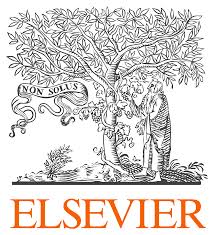
To each of the Award Winners, I can – on behalf of Springer and the International Journal of Life Cycle Assessment – hand over a Springer Book Voucher in the amount of 200 EUR.
On behalf of Elsevier I can present to each of the 6 Award winners an offer to publish their next article with 12 months free promotional access when submitted to a Virtual Special Issue across the two Elsevier journals: Journal of Cleaner Production and Resources, Conservation & Recycling.
I would like to also acknowledge the Academy Award Committee, which has had the difficult task to select the 6 Award winners:
- Harro Von Blottnitz, University of Cape Town
- Greg Thoma, University of Arkansas
- Rosenbaum Ralph, IRSTEA (National Research Institute of Science & Technology for Environment and Agriculture), France.
- Miguel Brandão, Royal Institute of Technology, Sweden
- Manuele Margni, CIRAIG, Ecole Polytechnique de Montréal
- Pere Fullana, School of International Trade (ESCI-Universitat Pompeu Fabra)
- Bo Weidema, Aalborg University
It was a bit of a surprise to the Award Committee how many papers are now published in the field of Life Cycle Assessment (LCA), not to mention all the conference presentations.
So we decided to focus on the published papers only, and only those that came out from a Scopus search on the term “Life Cycle Assessment”. A total of 1905 papers appeared for years 2016/17, and when limiting ourselves to the period after November 2016, a total of 898 articles. I cannot help compare to the situation in 1992 (25 years ago), where I could publish a meta-review of the approximately 250 publications that was including practically all that had been published on LCA up to then.
Another interesting result of our search was the large spread of the articles over different journals. What journals would you think to contain the largest number of LCA related articles?
Well, Journal of Cleaner Production comes out as the clear favourite with 21% of the 898 articles, followed by the International Journal of LCA. But what is fascinating is that the 898 articles are spread over 227 journals.
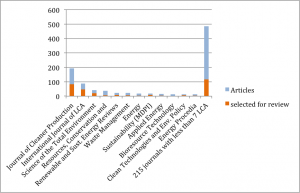
It is obvious that with such a large number of articles, we needed to make some subjective choices on what articles to take a closer look on. We performed a first screening, based on the topics of the articles, and selected 312 articles for closer inspection. We grouped these according to the 6 Award categories and found:
- 81 contributions to LCA modelling
- 134 contributions to sustainable production
- 12 contributions to sustainable consumption
- 50 contributions to policy application of LCA
- 6 contributions to LCA communication or teaching
- 29 contributions to LCA quality
So there is clearly more competition in some categories than in others.
So let us come to the final selections:
Best contribution to LCA modelling
In the category Best contribution to LCA modelling, the 81 contributions cover many different and important topics:
- LCI modelling topics, including allocation, crop rotation, data management, product design, forecasting, functional units, Input-output analysis, land use change, linear programming, marginal suppliers, product lifetime, scale, secondary effects, stocks, substitution, trade, waste co-treatment…
- LCIA methods and topics such as LCIA in the arctic, biodiversity, biotic resources, carbon balance, land use baseline situations, light as impact, near-field exposure, noise, soil, orbital space, thermal impacts, ecotoxicity, sustainability indicators, water for ecosystems…
- and also more broad issues such as combinations of methods, integration with LCC, model comparisons, model critique, spatial scales, and temporal issues
This goes to show that LCA is still a field in strong development in many different ways. Our problem as Award Committee was of course to select among these many important topics and many papers that could deserve an award. We finally reviewed 28 articles and 10 of them were nominated for the Award. They fell in the categories allocation, LCIA in the arctic, carbon balance, functional unit, marginal suppliers, noise, substitution, ecotoxicity, near-field exposure, and thermal impact.
So our selection is not so much a de-selection of the importance of all the topics we could not select and the important work that is done within them, but rather a selection of a contribution to a very significant topic for the credibility of LCA. The Award goes to the author of a paper on the identification of marginal suppliers: Matthias Buyle from University of Antwerp.
Best contribution to sustainable production
In the category Best contribution to sustainable production, the task of selection was even more difficult, with an initial selection of 134 contributions, out of which we reviewed 56 in detail. Only 4 papers made it to the final nominations, which shows that there is still much to be improved in the practical application and reporting of LCA studies, and maybe also in the work of the journal reviewers…
In the end, the Award Committee was quite split on the choice between two nominated papers, but in the end the Award goes to the author of a very thorough study on the allocation of supplementary cementitious materials, from The Hong Kong Polytechnic University: Md. Uzzal Hossain.
Dr. Hossain could unfortunately not make it from Hong Kong today, so he will receive the Award by mail. Allow me therefore to show two of the Figures from his paper. The first shows how economic allocation can give the very counterintuitive result that displacement of clinker leads to an increase in environmental burden compared to ordinary cement.
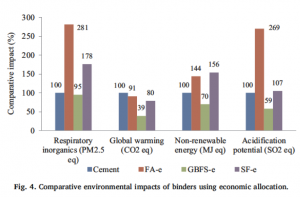
This can be compared to the results with system expansion, that shows the expected benefits:
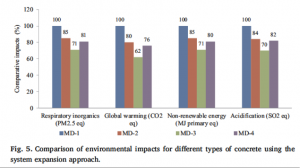
Best contribution to sustainable consumption
The category Best contribution to sustainable consumption is an area where the contribution from an LCA perspective is still only in its infancy. We had only 12 articles to choose between. We reviewed all in detail and nominated two, both on the topic of agent-based modelling. The finally selected article: “Environmental Impact Assessment of the Heterogeneity in Consumers’ Usage Behavior” has a clearly articulated link to LCA, is very clearly written and has some helpful graphics. This time we go the USA to find the authors, more precisely at the University at Buffalo, a State University of New York. The two authors share the Award: Ardeshir Raihanian Mashhadi and Sara Behdad.
Again, we have to excuse the Award winners and have to make do with a Figure from the paper:
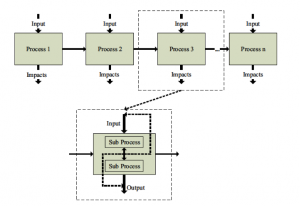
showing how conceptually the inputs and outputs of a process can be influenced by the interaction between two sub-processes – an interaction that can be modelled with agent-based modelling.
Best contribution to policy application of LCA
In the category Best contribution to policy application of LCA, we have 50 articles on topics including agri-food, apparel, aquaculture and fish, biotic resources, buildings and infrastructure, carbon, cities, desalination, electronics, energy, health care, hotspot analysis, industrial symbiosis, jewelry, leakage, LNG, milk, packaging, recycling, returned products, spatial scale, transport, and waste. Again, out of the mentioned 26 topics we decided to concentrate on 8 topics, including buildings, electronics, and waste, within which we reviewed 22 papers in detail. In the end, our attention focused on 3 papers on electronics: One was on high-quality collection and disposal of refrigerators, LCD-TVs, and mobile phones in Norway, with important insights and a good application of LCA. However, the topic of durability was well researched in the last two articles, looking at vacuum cleaners, refrigerators and ovens. Out of these two papers we finally chose the one with the most differentiated and solidly based results, using multiple data sources for inventory modelling and multiple mid-point indicators, and a very good application of LCA and LCC together, well-written, clear and policy-relevant. The award goes to: Fabio Iraldo from Scuola Supeirore Sant’Anna di Pisa.
Best contribution to LCA communication or teaching
In the category Best contribution to LCA communication or teaching, we have to note that only few articles focus on these topics specifically. This is unfortunately out of proportion to the importance of these topics. Out of the articles for consideration, two were nominated, one with the catchy title “Teaching life cycle assessment in environmental engineering: a disinfection case study for students” and the other a review article on LCA and research-based teaching in renewable and sustainable energy education. Normally, review articles are not material for Awards, but in this case we found some very deep and well-founded reflections on the role of LCA in teaching, and also an important call for the need for better communication. What made an impression on the Award committee is also that the first author has been an active participant in keeping these topics on the agenda for many years, so in this case we also regard our selection as more of a “lifetime” award. Congratulations to Helena Mälkki from Aalto University in Helsinki. She is present here today and will give us a few words on her work.
Best contribution to LCA quality
For the final Award category Best contribution to LCA quality we found 29 articles on topics including data collection, data sharing, disaggregation procedures, harmonisation, model combinations, remote sensing, and uncertainty. We reviewed 21 articles in detail, and our interest quite quickly focused on the topic of uncertainty. Particularly impressive we found the same first author of several excellent papers on this topic and even having contributions to other papers with similar level of quality. It was a unanimous Award Committee that decided for the Best contribution to LCA quality to give the Award to Evelyne Groen from Wageningen University.
Go read!
It remains for me only to say: Go read! These articles are not to be missed. And do follow the Award winners to keep up with their next publications. In the case of Evelyne Groen, you can even meet her in February here in Barcelona as teacher on a fresh version of our “Practical uncertainty analysis in LCA” course.
The articles that were selected for 2017 awards
Ardeshir Raihanian Mashhadi, Behdad S. (2017): Environmental Impact Assessment of the Heterogeneity in Consumers’ Usage Behavior: An Agent-Based Modeling Approach. Journal of Industrial Ecology doi:10.1111/jiec.12622
Evelyne A Groen, Bokkers E.A.M., Heijungs R., de Boer I.J.M. (2017): Methods for global sensitivity analysis in life cycle assessment. International Journal of Life Cycle Assessment 22:1125-1137.
Evelyne A Groen, Heijungs R. (2017): Ignoring correlation in uncertainty and sensitivity analysis in life cycle assessment: what is the risk? Environmental Impact Assessment Review 62: 98-109.
Fabio Iraldo, Facheris C., Nucci B. (2017): Is product durability better for environment and for economic efficiency? A comparative assessment applying LCA and LCC to two energy-intensive products. Journal of Cleaner Production 140:1353-1364.
Helena Mälkki, Alanne K. (2017): An overview of life cycle assessment (LCA) and research-based teaching in renewable and sustainable energy education. Renewable and Sustainable Energy Reviews 69:218-231.
Matthias Buyle, Pizzol M., Audenaert A. (2017): Identifying marginal suppliers of construction materials: consistent modeling and sensitivity analysis on a Belgian case. International Journal of Life Cycle Assessment https://doi.org/10.1007/s11367-017-1389-5
Md. Uzzal Hossain, Poon C.S., Dong Y.H., Xuan D. (2018): Evaluation of environmental impact distribution methods for supplementary cementitious materials. Renewable and Sustainable Energy Reviews 82(1): 597-608.
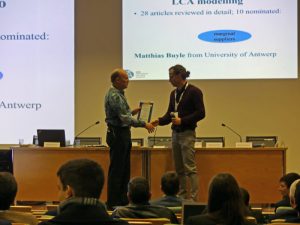
Matthias Buyle gets his 2017 Award for LCA modelling